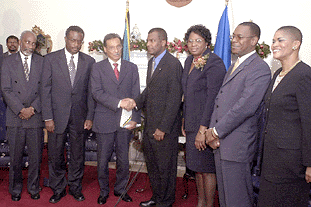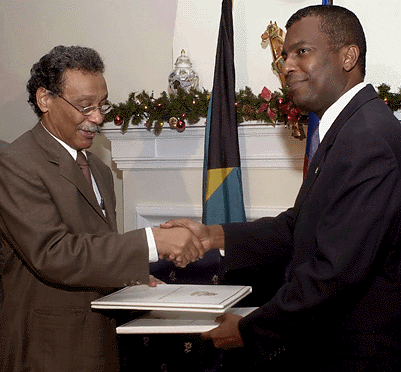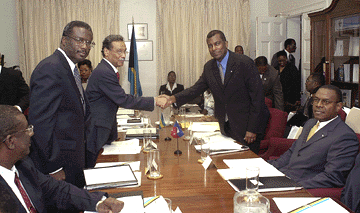I wish to add a personal note here. In my talks with your President in Port au Prince in July, we discovered that we were both born in the year 1953. He was born in July and I was born in October. I thought of it as a Dickensian moment, recalling to mind how in a Dickensís novel the unexpected and co-incidental often turned out to be propitious and fortuitous. I believe that my instincts on this will lead to good things for both countries.
That is not, however, to minimize the difficult task which we have before us. You and your colleagues are here representing a free and sovereign Haiti. You have more than 200 years of sovereignty behind you. My colleagues and I represent a free and sovereign Bahamas. We come to the table with almost 30 years of that experience behind us.
We come also with the knowledge that from the 19th century our fates have been intertwined. There have been patterns of migration to this country from Haiti since the revolution that established a sovereign Haiti. Today some of the names that Bahamians identify as Bahamian find their House and lineage in Haiti. Chief amongst them is that favourite son and first Black Member of Parliament in the Bahamas Stephen Dillettte.
 But
today we come to this table, recognising all that is past. The past
is truly the prologue to these events that will unfold over these next
two days. I think of a grander theme of close co-operation and exchange
but I realize also that in order to get to the grander themes, we must
cut to the chase and in the best interest of our respective countries do
what is best for our citizens.
But
today we come to this table, recognising all that is past. The past
is truly the prologue to these events that will unfold over these next
two days. I think of a grander theme of close co-operation and exchange
but I realize also that in order to get to the grander themes, we must
cut to the chase and in the best interest of our respective countries do
what is best for our citizens.
The relative prosperity of The Bahamas and the future prosperity of Haiti in my view depends very much on what we do here today. Our successes will reaffirm our mutual respect for our respective borders, for the value and sanctity of our respective citizenships, and speak volumes to our citizens about their responsibilities to our respective nations.
Your visit here today then signals a commitment to further our relations. I believe that we may be at an historic moment. But we have been at that moment before. I have read the previous treaties of 1971, 1985 and 1995 and no doubt our predecessors, greater persons than ourselves, had the same common intent. And yet we are at the table again in 2002, discussing the same issues. This time Minister we must not fail. We must in my view set reasonable and achievable goals for ourselves, and commit ourselves to a process of solving the migration issues so that we can move on to the grander themes.
This in my view will mean increased and closer cooperation at a technical and operational level, below the radarscope of international diplomacy.
 The
Bahamian people and my Prime Minister will expect no less from me. It is
an imperative. I dare say your President would have charged you with similar
responsibilities and goals on his behalf and that of the Haitian people.
The
Bahamian people and my Prime Minister will expect no less from me. It is
an imperative. I dare say your President would have charged you with similar
responsibilities and goals on his behalf and that of the Haitian people.
The framework for the way forward, the establishment of a joint commission to monitor our progress, the protocols for repatriation and the work on social and economic issues between us even after these formal negotiations are concluded will be works in progress. Our continued work will demand a sense of patriotic discipline on the part of the Bahamian people and the Haitian people to refrain from undermining the sovereign territorial integrity of our respective countries and threatening that of our neighbours by the smuggling of people. It will mean taking a hard line. Our governments will no doubt be calling upon law enforcement officials and legislators to do more, and it will take discipline to effect the will of this conference. The Haitian people have a stake in the continued success of The Bahamas, just as we have stake in the success of your country. We must therefore embrace this opportunity today and in the future with all the resources at our command to bring the issue of migration under control.
The Bahamas can now ill afford to absorb further illegal migration, or to regularise those illegally in the country. Currently, we expend more than one million dollars each year on the organisational and administrative mechanism required to deal with inflows and repatriation of illegal migrants to Haiti. The problem seriously impacts Governmentís ability to budget and plan effectively, because illegal migrants are not appropriately accounted for in national census.
 Madam
Deputy Prime Minister, Colleague Minister of Labour and Immigration, Foreign
Minister Antonio, Senior Public Officers of the Governments of The Bahamas
and the Republic of Haiti:
Madam
Deputy Prime Minister, Colleague Minister of Labour and Immigration, Foreign
Minister Antonio, Senior Public Officers of the Governments of The Bahamas
and the Republic of Haiti: